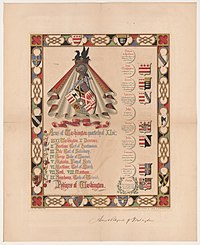
Back Familia Washington Spanish Famille Washington French 워싱턴가 Korean Вашингтоны Russian 华盛顿家族 Chinese
| Washington | |
|---|---|
 | |
 Pedigree and arms of the Washington line until George Washington | |
| Current region | Colony of Virginia |
| Earlier spellings | de Washington; earlier, de Wessyington |
| Etymology | Derives from Wessington (Washington) in the County of Durham |
| Place of origin | Washington Old Hall, England |
| Founded | 12th century |
| Traditions | Anglicanism |
| Motto | Exitus acta probat (Latin) (The outcome is the test of the act) |
| Estate(s) | Washington Old Hall, Mount Vernon, Abingdon (plantation), Arlington House, Beall-Air, Blakeley (West Virginia), Blenheim (Wakefield Corner, Virginia), Bushfield (Mount Holly, Virginia), Cedar Lawn, Claymont Court, Germantown White House, Fairfield (Berryville, Virginia), Ferry Farm, Harewood (West Virginia), Kenmore (Fredericksburg, Virginia), River Farm, Sulgrave Manor, Tudor Place, Washington Bottom Farm, George Washington Birthplace, Mary Ball Washington House, White House (plantation), Woodlawn (Alexandria, Virginia) |
The Washington family is an American family of English origins that was part of both the British landed gentry and the American gentry. It was prominent in colonial America and rose to great economic and political eminence especially in the Colony of Virginia as part of the planter class, owning several highly valued plantations, mostly making their money in tobacco farming. Members of the family include the first president of the United States, George Washington (1732–1799), and his nephew, Bushrod Washington (1762–1829), who served as Associate Justice of the Supreme Court of the United States.
The family's roots can be traced back to the 12th century in Washington, in the historic County Palatine of Durham in northern England, where their ancestral home was Washington Old Hall. In the 16th century, a branch settled at Sulgrave Manor in Northamptonshire. John Washington, born 1631 in Tring, Hertfordshire, England, arrived in the Colony of Virginia in 1657 after being shipwrecked.[1][2]